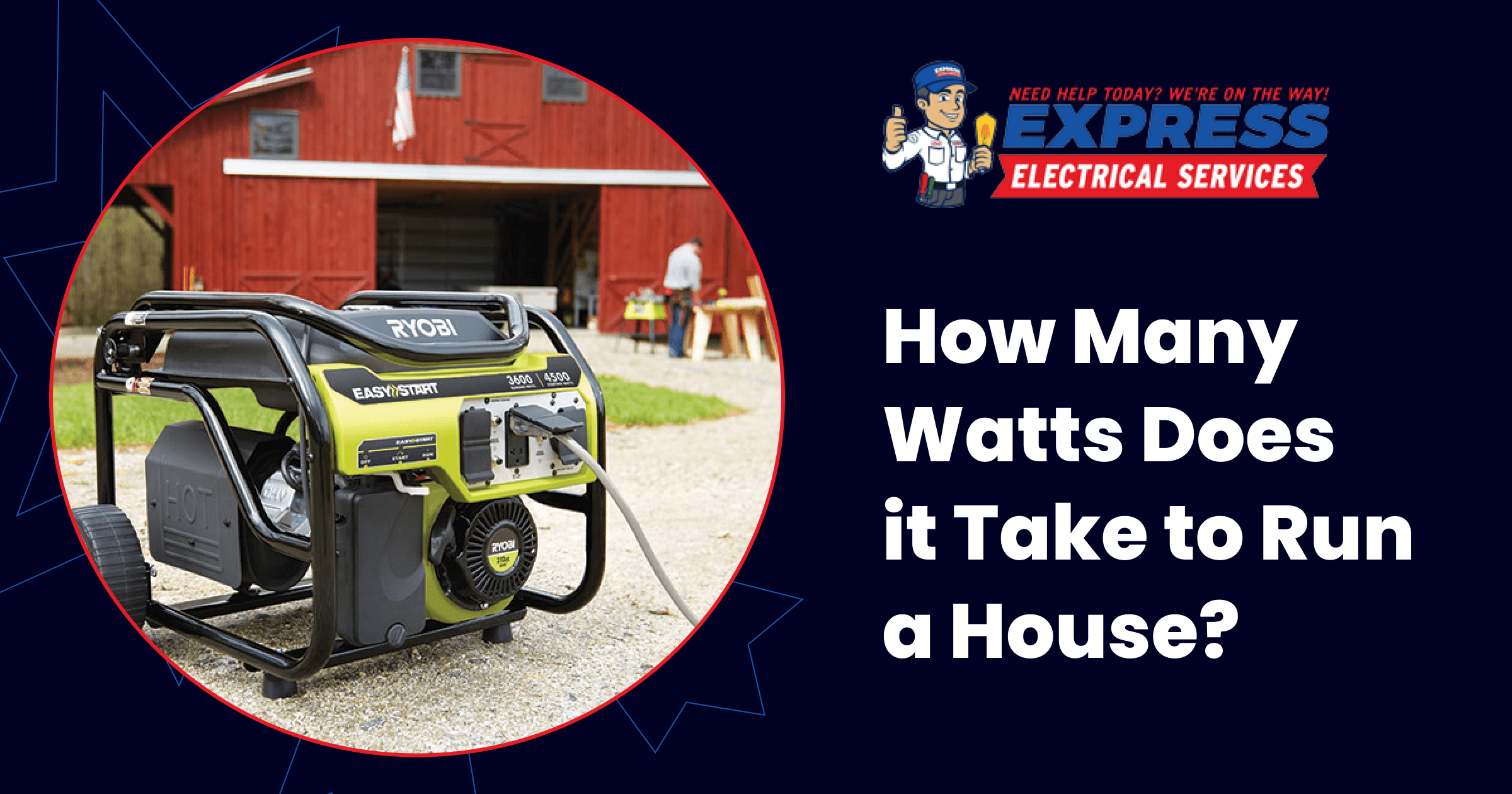How Many Watts Does It Take to Run a House?

No one wants to be stuck without power. Southern California frequently experiences power outages from storms, floods, and wildfires. A whole-home generator keeps your home running when things go dark.
How do you know what size generator to get? The professionals at Express Electrical can help you determine your home’s power needs and select the appropriate system. Let’s start by reviewing the basics of power draw and how many watts it takes to run a house.
Average Home Wattage Use
When selecting a whole home generator, it’s important to know the total wattage of your house. The unit’s capacity must support your power requirements.
In 2020, the average U.S. household used about 10,715 kilowatt-hours (kWh) of electricity. According to the Energy Information Administration, this equates to about 893 kWh per month. Divide yearly consumption by days in a year for a total of 29.36 kWh per day or 29,356 watt-hours (1kW = 1000W).
Keep this average in mind for later on when we calculate your household usage.
How Many Watts Does Your Home Need?
A generator’s size refers to its electrical output and not physical size. If a generator is too small, it’ll overload and either automatically turn off or overheat and short circuit. A short circuit can damage your appliances and the generator. An oversized generator is more costly to purchase and operate.
To determine the right size whole-home generator, you’ll need to know two factors:
- Starting Wattage: The number of watts needed at start-up.
- Running Wattage: The wattage needed for the device to operate or run.
You’ll need a generator with enough capacity to exceed the combined wattage of all electrically powered devices in your home. Use the total capacity of your electrical panel as a starting point.
Calculating Wattage
To calculate the right-sized generator, list every appliance it will power and the starting and running wattage. Then, add up your totals. Manufacturers list the wattage on the appliance’s electrical sticker. Follow this overview of what an appliance wattage profile might look like:
| Appliance |
Wattage (Starting/Running) |
|---|---|
| 2-Ton Central AC | 8,750/3,800 |
| Clothes Dryer | 6,570/5,400 |
| Electric Water Heater | 4,500/4,500 |
| Refrigerator/Freezer | 2,900/700 |
| Electric Range | 2,100/2,100 |
| Garage Door Opener | 1,420/720 |
| Microwave Oven (800W) | 1,300/1,300 |
| Washing Machine |
1,200/1,200 |
| 8+ Light Fixtures |
1,100/1,100 |
| Security System |
550/550 |
| Dishwasher (cool dry) |
540/216 |
| 2 Televisions (46”) |
380/380 |
| Laptop Computer | 250/250 |
In this scenario, your total starting wattage is 31,560W, and your running wattage is 22,216W. For that output, you need a 35kW whole-home generator. Of course, you also need to factor in toasters, coffee makers, food processors, cell phone chargers, space heaters, and other devices, depending on usage frequency.
Every home has unique power requirements. Therefore, you must consider everything that runs on electricity when selecting the right-sized generator. The example above may not be sufficient. Depending on your needs, you may need a 20-, 30-, or 50-kW generator. Contact the pros at Express Electrical to get installation assistance and the most accurate power draw calculation. After all, no one wants to fail an electrical inspection.
Other Factors To Consider
Consider a few other factors when calculating how many watts you need to power your home. Your household power needs change with the seasons. It’s unlikely that you’ll run your air conditioner at the same time as your furnace. Spas, hot tubs, and pools have different needs during the on and off seasons. You probably won’t run your ceiling fans and portable fans all year long. Factor in seasonal items as you add up your appliances and power draw.
Peak power demands spike your usage. Some days, all your major appliances may be in operation at the same time. For example, you’re vacuuming, running the dishwasher, the big game is on the television, the washer and dryer are on, the air conditioner is cooling the whole house, and you’re heating your third cup of coffee in the microwave. These collective power usages have a big impact on your overall power draw.
This is a good time to conduct an energy audit and identify how to make your home more energy efficient. An audit can also offer potential power savings. Our technicians help you assess your home’s energy efficiency and make recommendations with actionable solutions.
Finally, did you take into account any energy-efficient upgrades that may impact your overall power consumption? These upgrades can decrease your consumption, and with a whole-house generator, there is such a thing as too much power.
Hire a Licensed Electrician
Determining how many watts to run a house can be challenging, especially if your electrical requirements vary. Express Electrical offers all types of electrical services to homeowners in Southern California. Our licensed technicians can determine the best-sized generator and provide high-quality installation. We also specialize in safety services such as whole-house surge protection. To schedule an appointment, contact us online or call our office directly at (888) 350-7869.
Frequently Asked Questions
Do you have the necessary information on the efficiency ratings (SEER ratings for HVAC, ENERGY STAR ratings for appliances) to calculate power usage?
Your efficiency ratings are not always obvious. Contact the manufacturer for the most accurate information, and have your model number ready when you call. Even better, reach out via email — that way, you have a paper trail you can refer to later if needed.
Do you know how to read and interpret electricity bills to understand the monthly usage and identify any unusual patterns or spikes?
Your energy bill shows your monthly and average daily usage. Compare your current bill to previous bills to identify unusual patterns or spikes. If you’re uncertain about what it all means to your power consumption, call SCE or your electricity provider for clarity.

Leave A Comment